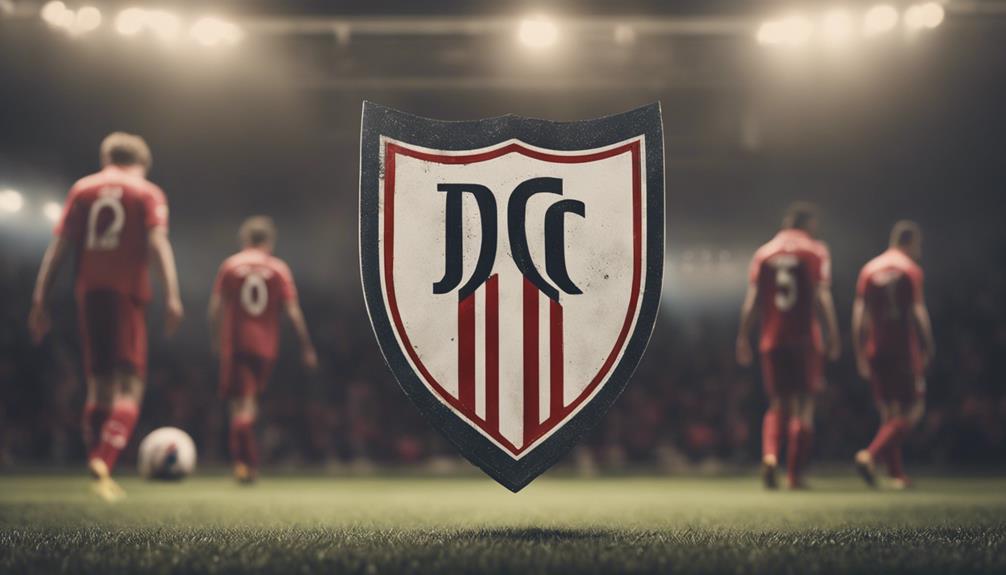
Understanding Soccer Relegation
April 28, 2024If you're exploring soccer, understanding relegation means teams face high-stakes battles. They endeavor to stay in top-flight leagues or risk dropping to lower divisions based on their performance. Relegation pushes underperforming teams down, while promotion rewards success from lower tiers. This system impacts club finances, player morale, and team dynamics. Teams aim to secure promotion to bounce back. Relegation spices up league competitions with drama and intensity. As you delve deeper into this concept, you'll uncover its vital role in shaping the competitive landscape of soccer.
History of Soccer Relegation
The history of soccer relegation traces back to the late 19th century in England, marking a significant shift in the competitive structure of the sport.
In the English Premier League relegation system, the bottom three teams in the league table are demoted to lower divisions, while lower division clubs have the opportunity for promotion.
This relegation and promotion system was first recorded in the 1892-1893 season, aiming to maintain competitiveness by allowing deserving teams from lower divisions to move up and weaker teams from higher divisions to move down.
This system has since been adopted by soccer leagues around the world, becoming a fundamental aspect of league systems globally.
The concept of relegation has transformed soccer competitions, ensuring that teams consistently perform at their best to secure their place in the top tiers of their respective leagues.
Relegation Vs. Promotion
Explaining the difference between Relegation and Promotion in soccer helps clarify the movement of teams between divisions based on their performance. Here's a breakdown to help you understand this essential aspect of soccer:
- Relegation: This occurs when teams perform poorly in a higher division and are moved down to a lower division for the next season. It serves as a way to maintain competitiveness in leagues by giving struggling teams a chance to rebuild in a lower division.
- Promotion: On the flip side, promotion happens when teams excel in a lower division and earn the right to move up to a higher division. This incentivizes teams to perform well and rewards their efforts with the opportunity to compete against tougher opponents.
- Financial Challenges: Relegated teams often face financial difficulties due to the loss of revenue streams like TV rights and sponsorships that come with being in a higher division.
- Financial Benefits: Conversely, promoted teams enjoy financial perks such as increased TV rights deals, sponsorships, and higher ticket sales as they move up the divisions, providing them with more resources to strengthen their squad and infrastructure.
Impact on Clubs and Players

When clubs face relegation, their finances take a hit, impacting their ability to retain top players and maintain team dynamics.
Elite players may seek opportunities elsewhere, affecting morale within the team.
The changes in squad composition can greatly alter the club's overall performance and competitiveness in the league.
Club Finances Affected
Facing relegation in soccer significantly impacts both clubs and players financially, leading to decreased TV revenues and league cash, making it challenging for clubs to attract top talent and maintain competitiveness.
- Financial Stability: Relegation can jeopardize the financial stability of clubs due to the loss of lucrative TV deals and league earnings.
- Player Acquisitions: Clubs find it harder to acquire quality players after relegation, as they struggle to compete with higher-level clubs in the transfer market.
- Sponsorships: Securing sponsorships becomes more difficult for relegated clubs, affecting their ability to generate additional revenue streams.
- Reputational Damage: The risk of losing elite players and facing reputational damage post-relegation poses significant challenges for clubs looking to bounce back.
Player Morale Impacted
Relegation in soccer not only impacts club finances but also greatly affects player morale, creating uncertainty and anxiety about their future in the sport. When a team faces relegation, players can feel demotivated and anxious, unsure of what the lower division holds for them.
The loss of prestige that comes with relegation can also hinder opportunities for players to showcase their skills at the highest level. Adapting to the challenges of lower division football after experiencing relegation can be tough for players.
Addressing the psychological effects of relegation on team dynamics and individual performances becomes essential as players work to maintain their motivation and performance levels in the face of uncertainty.
Team Dynamics Change
Team dynamics undergo significant transformations following relegation, impacting both clubs and players alike.
- Relegated clubs often struggle with financial stability, leading to challenges in maintaining sponsorships and attracting new players.
- Elite players may seek transfers to higher-level clubs after relegation, leaving the team with gaps in talent and experience.
- The process of attracting top talent becomes harder for relegated clubs, affecting their ability to rebuild and compete effectively in their new league.
- Player exits and financial struggles contribute to an overall sense of instability and uncertainty within the club, requiring strong leadership to navigate through the challenging period.
How Relegation Works

Understanding the mechanics of soccer relegation adds depth to the competition structure. Relegation is the process where teams are moved from a higher division to a lower one based on their performance. In most leagues, typically the bottom three teams in the league table get relegated to the division below. This demotion can have significant financial consequences for clubs due to the loss of TV revenues and league cash.
Once relegated, teams aim to regain promotion by excelling in the lower division. The threat of relegation adds drama and intensity to league competitions, keeping fans engaged throughout the season. The fear of being demoted to a lower division motivates teams to push harder and aim for better results. This dynamic creates a sense of urgency and competitiveness that's unique to leagues with relegation systems in place.
Relegation in Top Leagues
When it comes to Relegation in Top Leagues, like the Premier League and Bundesliga, it all comes down to the points.
The teams with the lowest points face the risk of being relegated to a lower division, adding pressure to every match.
Points are vital in determining a team's fate and can have lasting repercussions on their standing and future prospects.
Premier League Relegation
Premier League relegation, an essential aspect of top-tier football competitions, involves the relegation of the three teams with the lowest points to the Championship. Here are some key points to understand Premier League relegation better:
- Tiebreaker: Goal difference is important in determining which teams face relegation.
- Reputation: Relegation can impact a team's reputation greatly.
- Financial Stability: Moving down a division can pose financial challenges for relegated teams.
- Parachute Payments: To aid with financial stability, relegated teams receive parachute payments to help them adjust to the lower league.
Bundesliga Relegation
Relegation in the Bundesliga, similar to the Premier League, involves the 16th-placed team facing a promotion playoff against a team from the 2. Bundesliga. This relegation playoff is a two-legged tie, determining which team secures a spot in the upcoming Bundesliga season.
The drama unfolds as clubs battle to stay in the top flight, knowing that financial implications are at stake. The intense playoff can either lead to the survival of the 16th-placed Bundesliga team or the promotion of the 2. Bundesliga team.
The fight for Bundesliga survival adds an extra layer of excitement for fans and teams alike, making the end of the season a nail-biting experience for those involved.
Financial Implications of Relegation

Experiencing relegation in soccer can have severe financial consequences for clubs, affecting their ability to retain top players and secure lucrative sponsorships. Here are some key financial implications of relegation:
- Loss of TV Revenue and League Cash: Relegation often results in a significant decrease in TV revenue and league cash, which can have a major impact on a club's financial stability.
- Player Transfers: Players may opt to transfer to higher-level clubs following relegation, leading to a loss of key talent and potential transfer fees.
- Financial Struggles: Post-relegation, clubs may face financial struggles that make it challenging to attract top players and invest in the team's infrastructure.
- Sponsorships and Player Recruitment: Securing sponsorships and attracting new players can become more difficult after relegation, as the club's reputation and financial standing may be negatively affected.
Strategies to Avoid Relegation
Implementing essential tactics and solid team management are necessary for clubs aiming to secure their spot in the league and avoid the downward spiral of relegation. Teams often focus on securing important points against relegation-threatened rivals to improve their standing in the league table.
Recruitment of quality players during transfer windows is critical for teams looking to strengthen their squad and increase their chances of avoiding relegation. Strong defensive strategies and tactics play a crucial role in securing important wins and points necessary to escape the relegation zone.
Additionally, teams can capitalize on their home advantage by winning matches at their own stadium, which can greatly aid them in their quest to avoid relegation. Effective team management and motivation are also key factors in helping players perform at their best and navigate away from the threat of relegation.
Conclusion
So now you understand soccer relegation. It's not just about moving up or down, it's about survival.
Imagine a small club fighting tooth and nail to stay in the top league, their fans on the edge of their seats every game. The stakes are high, the pressure immense.
Relegation can make or break a club, but it also adds drama and excitement to the beautiful game.

